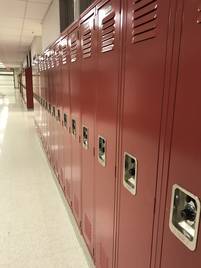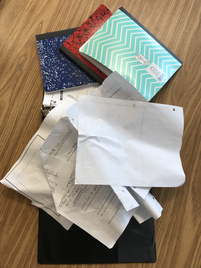 I've worked as a middle school educator for almost twelve years. I can easily channel my inner twelve year old, jetting myself back to my own junior high experience (yes, I was in 7th and 8th grade back when it was still called "junior high"). This year, however, is different. My oldest son is now in seventh grade, experiencing middle school at another school in our district. He loves middle school -- he's having fun and learning a lot. And I too have learned so much in these first few weeks as a middle school parent, already transforming my thinking as an educator. So in no particular order, here are just a few of the lessons I've learned so far. 12 isn't as old as I thought it was Until one lived in my house, I think I considered middle school kids as older, or more mature, than they actually are. I mean, they seemed so much older than my own two children that sometimes I forgot that they too, were in fact, fairly young children themselves. For example, our school district has a policy on showing movies in the classroom. At the middle school level, movies rated PG and PG-13 require parental opt-out prior to viewing. As librarian, I have educated teachers about this policy for years and supported it with forms for teachers to give to parents, however, sometimes I wondered quietly about whether this policy needed to be so rigid. Now, while my inclination would be to trust a classroom teacher's instructional decisions and I likely wouldn't opt my seventh grade son out of watching a PG-13 movie, the heads up would be key. My son hasn't seen a whole lot of movies at this MPAA rating (namely because his 8 year old brother is always around) -- we might preview the movie together and have a quick discussion about it in preparation for the classroom. Another space impacted by age: social media. It turns out that not every middle school kid has social media accounts. Sometimes the child just isn't interested yet, sometimes parents make clear choices to keep their children off of social media, sometimes families decide to abide by the requirements of social sites, which most of the time means account holders need to be 13. I realize now that if you use social media in your classroom or library, you can't assume that all students have Instagram or Twitter accounts. One work around is to make sure that your class feed is unlocked so that all students can view it using a simple link without having to login. Another option: embed it into your class website. It's easy to provide opportunities for students who don't have their own accounts to contribute to the class account. Self-advocacy is important...and HARD Middle school is a wonderful time for kids to begin to spread their wings, gain more independence, and figure out how to advocate for themselves -- to ask for help when they need it, to get clarification from a teacher when content is confusing. I very much think that this is a time when parents need to step back a bit and let their kids navigate teacher relationships and academic issues. However, asking for help in an academic setting is often something that's new to these kids. Staying after school or visiting a teacher during an intervention period the first time is nerve-wracking -- kids aren't always sure how it works and they have a lot of questions. Do they have to plan ahead? Make an appointment with a teacher? What happens if they are the only one who shows up? Can they still get help? Do they go their lockers before they arrive? Where will they catch the bus? As teachers we often take the answers to these questions for granted and we know that the kids will figure it out -- they always do. But I after seeing it through the eyes of my child and his friends, I know that I could be better. In the past, at library orientation, I have told students which days the library is open after school, but I neglected to explain the logistics of it all : sign up for a late bus in the cafeteria at lunch, show up in the library by 2:25pm, sign in on the computer at the front desk, stay until first block ends at 3:30pm. I think that as middle school educators we support our students learning to self-advocate by making our own expectations clear. Need students to sign up in order to get extra help? Put out a clipboard or Google form. Comfortable with students just showing up after school? Post your "office hours" so students know when they can appear. Is your intervention period dedicated to something specific (ie: review for a test or quiz corrections) or can kids just bring their questions and confused faces? I think that even if we make this type of information available already (which I know many of you do) that as a school community we could do a better job of walking new middle school students through the routines of staying after-school. I'm not sure what that looks like, but I will definitely be working with teachers in my building to do it better. Another self-advocacy tool is communication. An early-in-the-year middle school writing assignment could be to craft an e-mail to a teacher asking for some instructional support. I think you could even model and then have have students role play a conversation asking a teacher for help. We can't assume students have any idea how to write a professional note or have a professional conversation without teaching them this valuable skill.  Organization is paramount to middle school success Middle school is the first time students have lockers, a wide range of teachers with differing expectations, and a zillion supplies. There are lots of different things to manage and staying organized is key. But like self-advocacy, organization needs to be taught and, in the same way that we differentiate instruction, we have to offer students a range of way to organize to meet their own needs. At both the school where I work and the school my son attends, students are issued paper planners. These planners are intended to be used for daily assignments, longer term projects, and hall passes. However, in the same way that not every adult is a paper planner kind of person, not every student is either. We should teach kids other ways to manage their tasks, such as adding dates to their Google calendar so they can view their assignments from their computer or phone. I am also amazed at how quickly the paper gets out of control. My son has seven classes with binders and notebooks for every single one. Given that he can't fit all of his binders in his backpack at one time, he has decided to keep a "take home folder" (a holdover from elementary school) to bring assignments back and forth to school. As you might guess, however, these papers sometimes live in this folder long term, never making it into the appropriate binder. Some of his friends talk about lugging all necessary binders back and forth each day. What if during homeroom or intervention period teachers scheduled organization time every few weeks, asking students to bring in binders and papers to get sorted out? The students with color coded planners and beautiful binders could act as consultants to support the less organized kids. Communication doesn't have to stop in elementary school Elementary schools are traditionally very good at communicating with families. Parents are often at school for various events, teachers send regular newsletters, updating families about content and activities, work goes home in take-home folders. This is a natural fit for elementary grades -- teachers have 25-30 students in their classrooms and managing relationships with that many families is more approachable than that of a middle school teacher's student load of 130 or more. At the secondary level, parents receive a lot of information from the school as a whole -- details about fundraisers, activities, sports, clubs, and events. At the instructional level, parents need to be more proactive in seeking out information -- checking in with their child, logging into class Google sites, or accessing course management systems such as Blackboard. As a parent, I use all of these avenues, but one thing I love about my son's school is that his team sends out a weekly e-mail newsletter, including a short blurb from each teacher. It goes a long way to make parents feel like they are connected to classroom instruction. Not organized in teams? A weekly or bi-weekly note about what's going on in YOUR classroom keeps parents in the loop. Ask parents to submit their e-mail address via a Google form to make setting up a distribution list as easy as possible. * * * I have only just begun my journey as a middle school parent; I know that I have a lot more to learn. What did YOU learn about education when your own children hit the level you teach? -Gretchen You might also like:
2 Comments
Jan Packnett
10/15/2017 07:34:28 pm
This was wonderful Gretchen. It brought back so many memories. I look forward to supporting our students in figuring out the afterschool "what do I do" to get support from me for my classes. Another thing I did to support my now young adult son during middle and high school was to keep a folder every quarter of all his graded/ and non-graded papers, so that if at the end something was marked missing we checked all return papers etc. to see if he actually turned it in and a mistake was made. I provide my students an envelope at the end of each quarter to put their papers in. This allows them to check behind me and as well as organize for the next quarter. Thanks for reminding me how middle school students still need support, even if they don't ask for it,
Reply
Gretchen
10/25/2017 04:12:55 pm
Jan,
Reply
Your comment will be posted after it is approved.
Leave a Reply. |
Who We Are
Join our list!Archives
September 2020
Categories
All
|






 RSS Feed
RSS Feed